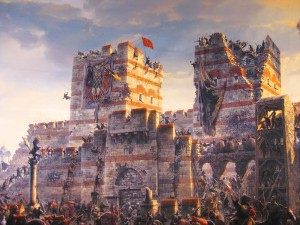June 23, 1757
Posted in General, On This Day on June 24th, 2009 by Eugene Finerman – 2 CommentsThe Seven Years War could more accurately be called the Nine Years War; les Canadiens and His Majesty’s Virginia Militia were fighting for control of the Ohio Valley some two years before they had the formal permission of Paris and London. In addition to its disputable length, the conflict could really be called the First World War. While it might be a rebuff to our North American ego, our front was minor. In fact, the French were reconciled to losing l’Amerique on the battlefield. The French colonists in North America were outnumbered 20 to 1 by the British, and with Britain’s mastery of the sea, there was no hope of sending reinforcements to the embattled Canadiens. Nonetheless, the French had a strategy.
The British navy did not control the Rhine, and so a hundred thousand French soldiers were ordered to march into Germany and seize Hanover from the British royal family. Then, at the eventual peace negotiations, the French would exchange Hanover for the return of Canada. Unfortunately for this French strategy, Hanover was protected by the nephew of George II, and he happened to be a military genius. The man really was entitled to be called Frederick the Great. Of course, the Prussian King was facing French generals who were chosen by their ability to flatter Madame de Pompadour.
Nonetheless, there was a third front–where the natives really were Indians–and the French had overwhelming odds in their favor. Suraj ud Daulah, the Nawab (Viceroy) of Bengal, was not a genuine Francophile; he was not drinking his chai from Limoges teacups and none of his wives were wearing the latest from Paris. Yet, he did have one trait that endeared him to France: he hated the English. Although the chosen successor of his grandfather, Suraj did have envious cousins (Well, who doesn’t?) and there were inevitable conspiracies and attempted rebellions. The East India Company, British imperialism’s corporate front on the subcontinent, had supported a losing claimant to Bengali rule, and the victorious Suraj was a vindictive winner.
Within two months of ascending to the Bengali throne, the 23 year-old Suraj attacked the British fort at Calcutta. According to folklore and British propaganda, on June 20, 1756 146 British prisoners were placed in a cell, 14 feet by 18 feet. The next morning, only 23 prisoners were still alive. This prototype and inspiration for airline seating is remembered as “The Black Hole of Calcutta”.
The British navy was ever at the service of its corporate friend, and Calcutta was soon back in the portfolio of the East India Company. But a chastened Suraj was still an enemy, and the Company was resolved to be rid of him. As befits an empire, the Company had its own army. Led by Robert Clive, a force of 3000 men–1000 Britons and 2000 native troops–marched into Bengal with the goal of overthrowing the Nawab. Suraj probably did not feel too threatened; he had 50,000 men as well as fifty cannons from his new French friends.
On June 23, 1757, Suraj’s army surrounded Clive’s meager force at a mangrove swamp near the village of Plassey. Ironically, Clive had to be constrained by his war council from attacking. Such confidence was not simply British arrogance; the Company had taken the precaution of bribing most of the commanders in Suraj’s army. Of the 50,000 soldiers Suraj thought he had, 45,000 actually were just spectators. The Nawab definitely had a personnel problem. His own uncle already had been hired by the Company as the next Nawab.
Suraj had to be quite disconcerted to see most of his army ignoring him. Although his loyal troops still outnumbered Clive’s force, the Nawab now had more to fear from his generals. With the enemy before him and traitors around him, Suraj decided to retreat; at least, he tried. He did succeed in escaping the rout, but nine days later he was captured by soldiers of the new Nawab. I think that you can imagine the nature of Suraj’s retirement package: abrupt.
For all the royal trappings, the new Nawab really was just an employee of the East India Company. In return for British support, he had ceded the control of Bengal to the Company. When he was just an ambitious courtier, he had not minded promising to pay 2.5 million Sterling to his British sponsor; but when he was an alleged sovereign, he rather resented the looting of the Bengal treasury. Ingratitude is a bad attitude in an employee; the Company replaced him after three years, hiring his son-in-law instead. But he turned out to be capable and conscientious, so he had to be fired, too.
Out of a British sense of protocol and pageantry, Bengal would continue to have Nawabs for another century; but there was no question as to who really ruled. And Bengal was only the first province. The rest of India would soon be part of the Company.
p.s. For more on this topic: https://finermanworks.com/your_rda_of_irony/2009/01/22/etiquette-and-empire/
https://finermanworks.com/your_rda_of_irony/2008/03/22/how-to-run-an-empire/
